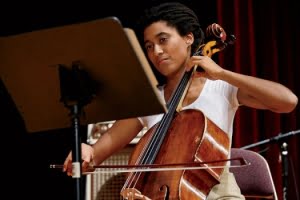Five years ago, the adventurous cellist Tomeka Reid created a groundbreaking event: the Chicago Jazz Strings Summit.
But, really, her aim stretched beyond jazz, in that she wanted to convene open-eared string players and open-minded listeners for music that would embrace jazz, classical, avant-garde and other idioms deeply connected to the art of improvisation.
Though Reid’s performance career soon became so busy that she couldn’t stage the summit annually, this weekend the fourth Chicago Jazz Strings Summit will bring unexpected sounds and novel techniques to Constellation and the Hungry Brain. Violinists, cellists, oud players and others will animate Reid’s goal of celebrating instruments often overlooked in jazz contexts.
And though Reid now lives in New York and travels the world constantly, her ties to Chicago make her a still important force in this city’s avant-garde.
“I think it was 2010, (violinist) James Sanders was at my house, and I was venting,” recalls Reid of how her project came to be.
“They have the trumpet summit,” she remembers telling Sanders, “and the piano summit and the drums summit — we need a string summit!
“There are even string festivals out there, but a lot of them concentrate on fiddling — not really on the avant-garde aspect of it.”
So in 2013 Reid launched the first Chicago Jazz Strings Summit, featuring no less than flutist Nicole Mitchell’s Black Earth Strings at the University of Chicago’s Logan Center for the Arts, among others.
“Then I started traveling a bunch, so I didn’t do it for ’14 or ’15,” says Reid, who couldn’t let the venture die and revived it during the past two years.
“Even though I’m traveling now more than then,” adds Reid, who’s now a member of the Art Ensemble of Chicago, “I’m still determined to keep it going. I want to create a kind of community for us as string players. Maybe bring some classical players over to this side. I would love to get more youth involved, so they can be improvising, or see that it’s a possibility.”
The cause means so much to Reid that this time around she’s underwriting it herself, with a little help from her musician friends.
“I just have been putting money aside, little by little,” says Reid. “I did get a 3Arts grant two years ago, and I’ve been saving some of that for this. Some of the artists this year were really kind — some are staying with friends, and that’s totally helping me out on the lodging part.”
What does Reid hope comes of all this?
“I want to have a space where people, over the course of a few nights, see the breadth of improvisational styles,” she says.
“Maybe there are people who book shows and say: ‘Yeah, there’s this great violinist I heard.’ Just put a spotlight on strings.”
Rediscovered Yiddish songs
During World War II, Soviet Yiddish scholars assiduously collected contemporary Yiddish songs documenting the horrors of the time, hoping eventually to publish them.
These lyrics and some of the melodies didn’t resurface until the 1990s, when long inaccessible archives opened up after the fall of the Soviet Union. Scholar Anna Shternshis later came upon them in Kiev and subsequently collaborated with colleague Pavel Lion (stage name Psoy Korolenko) to restore them.
Their work inspired the revelatory album “Yiddish Glory: The Lost Songs of World War II,” and the two scholars will offer a performance-lecture of this material Monday evening at Northwestern University’s Pick-Staiger Concert Hall, during this year’s Philip M. and Ethel Klutznick Lecture in Jewish Civilization (presented in conjunction with the Jewish United Fund of Metropolitan Chicago).
“The songs document the first eyewitness accounts of what happened to Jews in Europe,” says Shternshis, a professor at the University of Toronto.
“What they witnessed, or what they experienced, is so powerful emotionally, and is so outrageous, it’s something that prose cannot describe.”
Many of the songs “were written by women, and very often children — whose voices we rarely hear when we hear about history — and who are most vulnerable to ethnic violence and wars,” adds Shternshis.
She will speak about the songs and Korolenko will perform them, offering listeners a window into Holocaust history unavailable until now.







More Stories
Interview with Janis Siegel of The Manhattan Transfer: Jazz, being a more refined, interpreted form of music
CD review: George Benson – Dreams Do Come True: When George Benson Meets Robert Farnon – 2024: Video, CD cover
The band was tight as ever. The Warren Haynes Band cuts loose: Video, Photos